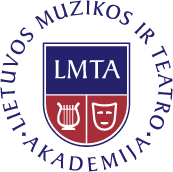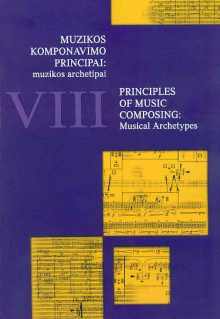The present publication is comprised of scientific reports made at the 8th International Music Theory Conference (April 23–25, 2008) “Principles of Music Composing: Musical Archetypes”. The organizers of the conference are the Lithuanian Academy of Music and Theatre and the Lithuanian Composers’ Union.
Twenty reports that comprise the content of the present publication were made by musicologists from 10 countries (Rumania, Estonia, the United Kingdom, Russia, Greece, Serbia, France, Poland, Brazil and Lithuania). The speakers most actively responded to the following three subthemes of the conference:
1) conceptions an definitions of Archetype (outlooks, sources and development); 2) archetypes and a national identity of music; ethnomusical archetypes; 3) Manifestation of archetypes in composing practice of contemporary music (20th–21st c.).
Articles
- Pratarmė
- Foreword
- Archetipo sąvoka ir teorinės koncepcijos (požiūriai, ištakos, plėtotė) / Conceptions and Definitions of Archetype (Outlooks, Sources, Development)
-
Rastko Jakovljević.
Encoding the Archetype: The Cases of Repetition and Contrast in Music -
Pavel Puşcaş.
Symbolic Connotations of the Tonalities – are these Archetypes? -
Pavel Puşcaş.
Archetype, Anarchetype and Eschatype in the Dynamics of Musical Style -
Mart Humal.
The Voice-Leading Matrix as an Archetype of Tonal Counterpoint -
Panayiotis Demopoulos.
‘The Third Song’ – Anonymity as an Avant-garde Archetype -
Igor Vorobyev.
The Avant-garde as a Prototype of Totalitarian Art (Sketches of the History of Russian Musical and Non-Musical Avant-garde) -
Margarita Katunyan.
Structural Archetypes in Composition: Monteverdi, Mozart, Martynov -
Kostas Chardas.
Old Ideas in New Contexts: the Presence and (Re)interpretation of Tonal Archetypes in 20th-century Music -
Elvio Cipollone.
The Sound of Silence - Archetipai ir nacionalinis muzikos savitumas. Etnomuzikos archetipai / Archetypes and a National Identity of Music. Ethnomusical Archetypes
-
Kalliopi Stiga.
Musical Archetypes and the “Greek Musical Character” through Time… -
Rimantas Janeliauskas.
Prognostic Criteria of M. K. Čiurlionis‘ Spontaneous Musical Cycle -
Zlata Marjanović.
“Full Voice” Songs of Montenegro Seacoast and Hinterland -
Daiva Račiūnaitė-Vyčinienė.
The Archetypical Structure of Lithuanian Folklore Rhythms: from Sutartinės to Feasting Songs -
Rimantas Astrauskas.
Archetypes in Lithuanian Traditional Music: Intoning Aspect - Archetipų apraiškos šiuolaikinėje muzikos komponavimo praktikoje (XX–XXI a.) / Manifestation of Archetypes in Composing Practise of Contemporary Music (20th–21st c.)
-
Bogumiła Mika.
Bogurodzica – as an Archetype for Polish art Music of the 20th Century -
Liduino Pitombeira, Luciana Gifoni.
Compositional Archetypes, National Identity and Geometric Symbolisms -
Rimantas Janeliauskas.
The Relationship of the Composer with a Melodic Archetype in B. Bartók’s Work -
Gražina Daunoravičienė.
The Verbal Text as a Compositional Prototype and Inspiration: “Cum essem parvulus” by O. di Lasso and R. Mažulis -
Ewa Kowalska-Zając.
The 20th Century Polish Composers towards the String Quartet Archetype -
Gaël Tissot.
François Bayle’s Music: Archetypes and Visual Thinking - Autoriai / Authors

